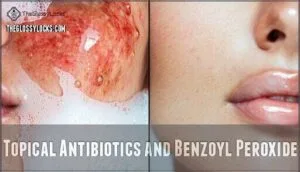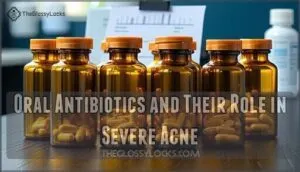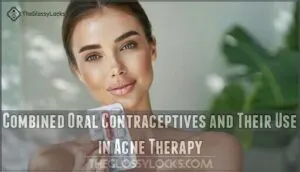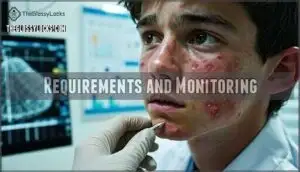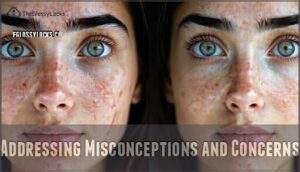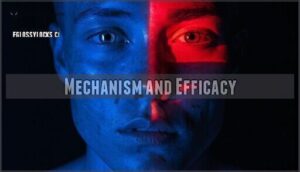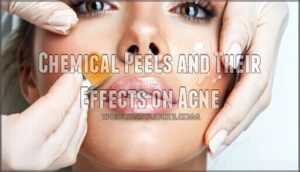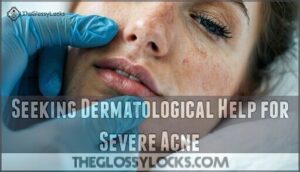This site is supported by our readers. We may earn a commission, at no cost to you, if you purchase through links.
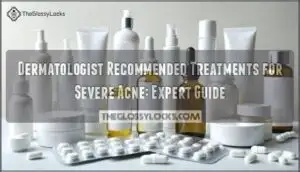
Your dermatologist will likely start with topical retinoids like tretinoin, which unclog pores and reduce inflammation.
Benzoyl peroxide kills acne bacteria, while oral antibiotics like doxycycline tackle infection from within.
For stubborn cases, isotretinoin (Accutane) remains the gold standard, though it requires careful monitoring.
Women might benefit from hormonal treatments like spironolactone or birth control pills.
Chemical peels and light therapy can provide additional support.
Think of these treatments as a toolkit—your dermatologist will customize the right combination based on your skin’s unique needs and response patterns.
Table Of Contents
- Key Takeaways
- Topical Retinoids and Retinoid-like Drugs
- Topical Antibiotics and Benzoyl Peroxide
- Azelaic Acid as a Safe Option
- Oral Antibiotics and Their Role in Severe Acne
- Combined Oral Contraceptives and Their Use in Acne Therapy
- Anti-androgen Agents for Women and Adolescent Girls
- Isotretinoin: a Treatment for Severe and Unresponsive Acne
- Light Therapy and Its Role in Acne Treatment
- Chemical Peels and Their Effects on Acne
- Seeking Dermatological Help for Severe Acne
- Frequently Asked Questions (FAQs)
- Which treatment is best for severe acne?
- What is the strongest treatment for acne?
- What is the most extreme acne treatment?
- What is the best thing for severe acne?
- How long does it take to see results from acne treatment?
- What are the side effects of acne medication?
- Is it safe to use acne medication during pregnancy?
- What causes acne?
- What are the treatment options for severe acne?
- Can diet changes help reduce severe acne?
- Conclusion
Key Takeaways
- You’ll need a combination approach – topical retinoids like tretinoin work with oral antibiotics or isotretinoin for stubborn cases, as no single treatment tackles all aspects of severe acne
- Isotretinoin (Accutane) is your strongest option that can permanently cure about 50% of severe cystic acne cases, though it requires careful monitoring and strict pregnancy prevention protocols
- Women’s hormonal treatments like spironolactone or birth control pills can be game-changers for acne triggered by androgen hormones and oil overproduction
- You’ll see results in 2-3 months with consistent use, but professional dermatologist guidance is essential since severe acne requires prescription-strength treatments and monitoring for side effects
Topical Retinoids and Retinoid-like Drugs
Topical retinoids represent the gold standard for treating severe acne, working by accelerating skin cell turnover and preventing pores from becoming clogged.
Retinoids accelerate skin renewal, clearing clogged pores to transform stubborn acne over time.
While these prescription-strength medications can dramatically improve your skin over time, they often cause initial dryness, redness, and peeling that requires patience and proper application techniques.
Application and Effectiveness
Topical retinoids represent dermatologist recommended treatments for severe acne treatment that require strategic application for maximum results. These prescription acne medication options work by unclogging pores and accelerating cell turnover, making proper application vital for success.
Treatment duration typically spans 4-8 weeks for initial improvement, with full long-term results emerging by 16 weeks. Patient compliance substantially impacts efficacy factors, as consistent use determines therapeutic success.
For those seeking products, explore options for effective retinoid application.
Key application guidelines include:
- Apply a thin layer across the entire acne-prone area, not just individual blemishes
- Use at bedtime to minimize sun sensitivity and maximize absorption
- Start with every other night to build skin tolerance gradually
- Combine with gentle moisturizer to prevent excessive dryness and irritation
Topical retinoids deliver measurable improvements when you follow your dermatologist’s instructions precisely, transforming your skin’s texture and clarity over time.
Potential Side Effects
While prescription acne medication offers significant benefits, you’ll likely experience some side effects.
Skin irritation, dryness, and redness are common when starting topical retinoids—think of it as your skin adjusting to its new routine.
Isotretinoin treatment requires careful monitoring due to potential long-term effects on liver function and mood.
Oral antibiotics may cause stomach upset and increase medication interactions.
Allergic reactions, though rare, can occur with any prescription treatment.
Most side effects diminish as your skin adapts, reducing scarring risk from severe acne.
Topical Antibiotics and Benzoyl Peroxide
When you’re battling stubborn acne that won’t respond to gentler treatments, topical antibiotics paired with benzoyl peroxide become your dermatologist’s go-to combination therapy.
This powerful duo works by targeting acne-causing bacteria while preventing the development of antibiotic resistance that can occur with antibiotics alone.
Combination Therapy
When dermatologists prescribe combination therapy, they’re leveraging synergistic effects to tackle severe acne more effectively.
Topical antibiotics paired with benzoyl peroxide create individualized protocols that prevent bacterial resistance while optimizing outcomes.
This strategic treatment sequencing often includes oral antibiotics or isotretinoin for stubborn cases, ensuring your skin gets the thorough care it deserves through targeted prescription treatments.
Considerations for Long-term Use
Long-term topical antibiotic use can backfire, creating resistance development that makes future treatments less effective.
While benzoyl peroxide helps prevent this issue, prolonged use may trigger skin sensitivity or irritation.
Your dermatologist should monitor maintenance therapy carefully, especially since severe acne’s psychological impact makes consistent treatment essential.
Prescription treatments require balance between scarring prevention and avoiding unnecessary side effects from extended use.
Azelaic Acid as a Safe Option
Finding the right acne treatment can feel like traversing a maze, especially when you’re dealing with sensitive skin or special circumstances. Azelaic acid stands out as a gentle yet effective option that won’t leave your skin feeling raw or irritated.
This naturally occurring acid offers multiple Azelaic Benefits that make it perfect for Sensitive Skin types. Unlike harsher treatments, azelaic acid reduces inflammation while targeting acne-causing bacteria without the typical drying effects. It’s particularly valuable for Pregnancy Safety, making it one of the few acne treatment options expectant mothers can use confidently.
Here’s what makes azelaic acid special:
- Provides Melasma Treatment by reducing dark spots and hyperpigmentation
- Offers Rosacea Relief through its anti-inflammatory properties
- Works effectively on severe acne without harsh side effects
- Safe during pregnancy and breastfeeding periods
- Gentle enough for daily use on sensitive skin
While over-the-counter versions are available, consulting a dermatologist helps determine whether you need stronger prescription treatments suited to your specific skin concerns. Consistent use of sunscreen helps in preventing premature wrinkles.
Oral Antibiotics and Their Role in Severe Acne
When severe acne doesn’t respond to topical treatments, your dermatologist may prescribe oral antibiotics to tackle the bacteria causing deep, painful breakouts.
When topical treatments fail, oral antibiotics attack acne-causing bacteria from within your system.
These medications work from the inside out, but they come with important considerations about effectiveness and long-term use that you’ll need to discuss with your doctor, particularly regarding their long-term implications.
Effectiveness and Risks
While azelaic acid offers gentleness, oral antibiotics pack more punch for severe acne.
These prescription treatments deliver powerful bacteria-fighting action, but they’re not without trade-offs.
Balancing Treatment Efficacy and Patient Tolerance:
- Treatment Efficacy: Oral antibiotics like doxycycline target acne-causing bacteria effectively, reducing inflammatory lesions within weeks
- Side Effects: Common reactions include stomach upset, sun sensitivity, and dizziness—manageable but worth discussing with your doctor
- Risk Mitigation: Dermatologists limit treatment duration and monitor progress, ensuring severe acne improves while minimizing long-term outcomes concerns
Your doctor will weigh isotretinoin alternatives against these prescription treatments’ benefits.
Combating Antibiotic Resistance
Antibiotic resistance poses a significant threat when treating acne with oral antibiotics. Resistance mechanisms develop when Propionibacterium acnes adapts, making standard acne medications less effective.
International antibiotic stewardship guidelines recommend limiting antibiotic courses to under 12 weeks and avoiding monotherapy. Alternative therapies like combining oral antibiotics with topical treatments enhance effectiveness while reducing resistance risk.
Diagnostic tools help identify treatment failures early, preventing unnecessary exposure. You’ll benefit from combination approaches that preserve antibiotic efficacy.
Research funding continues exploring novel acne treatment options. Healthcare providers emphasize proper antibiotic use, ensuring these powerful medications remain effective for severe cases requiring systemic intervention.
Studies show that minocycline displays sensitivity against C. acnes.
Combined Oral Contraceptives and Their Use in Acne Therapy
Hormonal fluctuations create the perfect storm for acne breakouts, making birth control pills a game-changer for many women.
These oral contraceptives tackle hormonal acne by suppressing androgen production, which reduces oil production and prevents clogged pores.
Here’s how hormonal acne therapy works:
- Pill Types: Four FDA-approved formulations specifically target acne while providing contraception
- Efficacy Duration: Results typically appear after 2-3 months of consistent use
- Patient Selection: Best suited for women seeking both acne control and birth control
Side effects can include nausea, headaches, and mood changes, though serious complications remain rare. Your dermatologist will screen for contraindications before prescribing, ensuring you’re a good candidate for this dual-purpose treatment approach.
Combined oral contraceptives can substantially reduce acne, showing a 55% reduction in lesions after six months. Some pills, like those with drospirenone, may have more potential side effects than others.
Anti-androgen Agents for Women and Adolescent Girls
Anti-androgen therapy offers targeted relief for women and adolescent girls battling hormonal acne, particularly when standard treatments fall short.
These medications work by blocking androgen hormones that trigger excess oil production and inflammatory breakouts.
- Spironolactone benefits include reduced sebum production and fewer cystic lesions, with improvements typically visible within 3-6 months of consistent treatment adherence.
- Cyproterone acetate combined with birth control pills provides dual action against hormonal fluctuations while offering contraceptive protection for sexually active patients.
- Anti-androgen alternatives like topical clascoterone deliver localized hormone-blocking effects without systemic side effects, making them suitable for younger patients.
- Flutamide risks include rare but serious liver toxicity, which is why dermatologists prefer safer options like spironolactone for long-term hormonal acne management.
Isotretinoin: a Treatment for Severe and Unresponsive Acne
When you’ve tried everything else and severe acne still won’t budge, isotretinoin might be your dermatologist’s next recommendation.
This powerful oral medication, once known as Accutane, can cure severe cystic acne in about 50% of cases by shrinking your oil glands and dramatically reducing sebum production.
Requirements and Monitoring
Starting isotretinoin requires strict Treatment Adherence and Regular Checkups with your dermatologist.
You’ll need monthly Blood Tests to monitor liver function and cholesterol levels throughout treatment.
Pregnancy Prevention is mandatory for women due to severe birth defects risk.
Your doctor will track Side Effects closely, from dry skin to mood changes.
This careful monitoring guarantees isotretinoin safely treats your severe acne when other oral medications haven’t worked.
Addressing Misconceptions and Concerns
Despite concerns about medication side-effects, isotretinoin remains safe and effective for severe acne and cystic acne.
Your dermatologist will address scarring fears—this treatment actually prevents acne scars by clearing breakouts.
Cost concerns shouldn’t deter you from seeking help, as many insurance plans cover isotretinoin.
While lifestyle adjustments may be needed, treatment expectations should remain realistic.
Most patients tolerate the medication well, and one course can provide long-term resolution of stubborn acne.
Light Therapy and Its Role in Acne Treatment
Light therapy offers a promising treatment option for stubborn acne that hasn’t responded to traditional medications.
You’ll need multiple sessions with your dermatologist to see desirable results, as the therapeutic light gradually targets acne-causing bacteria and reduces inflammation over time, which can lead to desirable results.
Mechanism and Efficacy
How does light therapy actually work against severe acne? Light therapy targets P. acnes bacteria and reduces inflammation through specific wavelengths.
Your dermatologist may recommend this treatment when topical medications need extra support. Here’s how light therapy delivers treatment outcomes:
- Blue light kills acne-causing bacteria directly
- Red light reduces inflammation and promotes healing
- Combined wavelengths enhance comparative effectiveness
- Multiple sessions prevent resistance development
- Professional monitoring guarantees maximal efficacy factors
This acne treatment works best alongside isotretinoin or other acne medications for thorough severe acne management.
Many patients find success with at-home devices.
Considerations for Multiple Doctor’s Visits
Planning light therapy appointments requires commitment to regular appointments with your dermatologist’s office.
Treatment adherence means scheduling multiple sessions over weeks or months, creating cost implications and potential travel burden.
Dermatologist recommended protocols demand consistent communication strategies between visits.
This prescription acne treatment for severe acne isn’t a quick fix, so you’ll need patience and planning for desirable results.
Chemical Peels and Their Effects on Acne
Chemical peels offer a controlled way to remove damaged skin layers and unclog pores, helping reduce both active acne and post-acne marks.
You’ll see immediate improvements in skin texture, though long-term benefits require multiple sessions and consistent follow-up care to maintain results, including the reduction of post-acne marks.
Improving Skin Appearance
Chemical peels effectively transform your skin’s appearance by removing damaged outer layers, revealing clearer, smoother skin underneath.
These treatments excel at addressing multiple concerns simultaneously, promoting thorough skin rejuvenation.
Key benefits for acne-prone skin include:
- Acne scarring reduction through controlled exfoliation
- Skin texture improvement by smoothing rough, uneven surfaces
- Redness reduction from inflammatory acne lesions
- Even skin tone restoration by targeting hyperpigmentation
- Hydration methods enhancement as newer skin retains moisture better
The process stimulates cellular turnover, helping fade acne scars and hyperpigmentation while improving overall skin tone improvement.
You’ll notice enhanced clarity and reduced blemishes as the treatment removes dead skin cells that contribute to clogged pores.
Many people find relief through chemical peel products.
Short-term Vs. Long-term Benefits
Five key factors determine chemical peel success for severe acne. Immediate Relief starts within days as peels reduce active breakouts and inflammation. However, Lasting Effects require multiple sessions over months.
Your dermatologist will customize Treatment Duration based on cystic acne severity and Scarring Outcomes goals.
| Timeframe | Benefits |
|---|---|
| Short-term (1-2 weeks) | Reduced breakouts, smoother texture, less inflammation |
| Medium-term (1-3 months) | Fading dark marks, improved skin clarity after series |
| Long-term (6+ months) | Sustained results with maintenance, Relapse Prevention |
Professional peels outperform daily topicals for acne scar removal, though isotretinoin remains the gold standard for severe cases. Maintenance every 2-3 months keeps skin clear long-term.
Seeking Dermatological Help for Severe Acne
When your acne becomes severe, persistent, or leaves scars, it’s time to consult a dermatologist who can assess your specific condition and create a targeted treatment plan.
A professional evaluation guarantees you receive the most effective prescription treatments and avoid the frustration of trying countless over-the-counter products that may not address your particular type of severe acne, ensuring you get the right treatment for your specific condition.
Importance of Professional Evaluation
Why struggle with stubborn breakouts when personalized skincare from a dermatologist can transform your skin?
Professional dermatological acne care provides accurate diagnosis of your specific acne type, enabling treatment tailoring that targets root causes.
Dermatologist acne care goes beyond generic solutions, offering dermatological solutions for acne that prevent scarring while managing expectations for realistic timelines and results.
Addressing Treatment Challenges
While professional evaluation sets the foundation for treatment, addressing acne care challenges requires practical strategies.
Treatment adherence becomes easier when you understand what to expect from your dermatologist acne care journey. Many patients struggle with cost considerations, especially for severe acne treatments like isotretinoin.
Here’s how to tackle common obstacles:
- Managing expectations – Cystic acne treatments often take 3-6 months to show results, so patience prevents disappointment
- Cost considerations – Ask about generic alternatives and patient assistance programs for expensive medications
- Scarring prevention – Don’t skip follow-up appointments, as early intervention stops permanent damage
- Mental health support – Severe acne affects self-esteem, so consider counseling alongside dermatological treatment
Remember, your dermatologist wants you to succeed, so communicate openly about any barriers you’re facing. Lifestyle adjustments, like consistent sleep patterns, can also substantially influence treatment outcomes.
Frequently Asked Questions (FAQs)
Which treatment is best for severe acne?
Like taming a wild storm, you’ll need isotretinoin (Accutane) – the gold standard for severe cystic acne. It shrinks oil glands and can cure about 50% of cases permanently.
What is the strongest treatment for acne?
Isotretinoin (Accutane) is the strongest acne treatment available. It shrinks oil glands, reduces sebum production, and can cure severe cystic acne in about half of patients permanently.
What is the most extreme acne treatment?
Isotretinoin stands as the most extreme acne treatment available.
This powerful oral medication shrinks oil glands and can cure severe cystic acne permanently, though it requires strict monitoring for potential side effects.
What is the best thing for severe acne?
When push comes to shove, isotretinoin (Accutane) is your heavy hitter for severe cystic acne. It shrinks oil glands and tackles inflammation head-on, delivering lasting results where other treatments fail.
How long does it take to see results from acne treatment?
You’ll typically see results from acne treatments in 2-3 months or longer. Don’t get discouraged if things seem slow—your skin needs time to adjust and heal properly.
What are the side effects of acne medication?
Ever wonder if that miracle acne cure comes with a catch?
Most acne meds cause dryness, redness, or peeling initially.
Stronger treatments like isotretinoin can affect mood, liver function, and require birth control due to severe birth defects.
Is it safe to use acne medication during pregnancy?
Most acne medications aren’t safe during pregnancy.
You’ll need to avoid retinoids, antibiotics like tetracycline, and hormonal treatments.
Safe options include topical benzoyl peroxide and some gentle cleansers – always consult your doctor first.
What causes acne?
Your pores get clogged when oil, dead skin cells, and bacteria team up like unwelcome roommates.
Hormones fuel this process, especially testosterone, which cranks up oil production and creates the perfect storm for breakouts.
What are the treatment options for severe acne?
You’ll likely need prescription medications like isotretinoin (Accutane), oral antibiotics, or hormonal treatments like spironolactone. Dermatologists may also recommend cortisone injections for cystic lesions or advanced laser therapies.
Can diet changes help reduce severe acne?
Studies show 75% of severe acne sufferers see improvement with dietary changes, particularly reducing dairy and high-glycemic foods.
While you can’t cure severe cystic acne through diet alone, cutting back on milk products and processed sugars often helps reduce inflammation.
Conclusion
Managing severe acne is like assembling a personalized arsenal—each weapon serves a specific purpose in your battle against breakouts.
Your dermatologist will craft a strategic approach using dermatologist recommended treatments for severe acne, combining topical retinoids, antibiotics, and hormonal therapies based on your skin’s response.
Remember, clear skin doesn’t happen overnight, but with professional guidance and patience, you’ll find the right combination that works for your unique situation.
- https://www.mayoclinic.org/diseases-co
- https://pubmed.ncbi.nlm.nih.gov/22114965/
- https://www.aad.org/media/stats-numbers
- https://www.goodrx.com/isotretinoin?rvo_aff=1&rvo_brandid=GoodRx&rvo_prodid=2545fe51-8f98-4e39-b5f3-d03cd3894005&rvo_subid=2545fe51-8f98-4e39-b5f3-d03cd3894005&rvo_subid2=%2Fhealth%2Fskin%2Fwp-3879107&correlationId=null
- https://hersinc.pxf.io/banoRM?rvo_aff=1&rvo_brandid=Hers&rvo_prodid=84cbf15c-e8a8-4178-b304-3896f8a42fdb&rvo_subid=84cbf15c-e8a8-4178-b304-3896f8a42fdb&rvo_subid2=%2Fhealth%2Fskin%2Fwp-3879107&subid1=null&subid2=/health/skin/wp-3879107&subid3=c2d81563-9ade-4d90-893a-d3bc8637811c&correlationId=null

